人教版英语江西中考新突破训练话题十五天气
- 格式:doc
- 大小:180.14 KB
- 文档页数:7
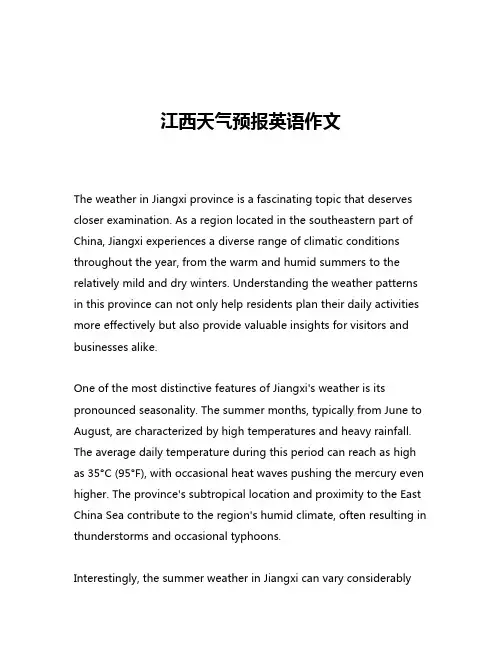
江西天气预报英语作文The weather in Jiangxi province is a fascinating topic that deserves closer examination. As a region located in the southeastern part of China, Jiangxi experiences a diverse range of climatic conditions throughout the year, from the warm and humid summers to the relatively mild and dry winters. Understanding the weather patterns in this province can not only help residents plan their daily activities more effectively but also provide valuable insights for visitors and businesses alike.One of the most distinctive features of Jiangxi's weather is its pronounced seasonality. The summer months, typically from June to August, are characterized by high temperatures and heavy rainfall. The average daily temperature during this period can reach as high as 35°C (95°F), with occasional heat waves pushing the mercury even higher. The province's subtropical location and proximity to the East China Sea contribute to the region's humid climate, often resulting in thunderstorms and occasional typhoons.Interestingly, the summer weather in Jiangxi can vary considerablyacross different parts of the province. The mountainous regions, such as the Wuyi Mountains and the Lushan Mountains, tend to be slightly cooler and drier compared to the low-lying areas near the Yangtze River and its tributaries. This is due to the elevation and the moderating effect of the mountainous terrain on the local microclimate.As autumn approaches, Jiangxi's weather begins to transition, with temperatures gradually dropping and rainfall decreasing. The months of September and October are generally pleasant, with average daily temperatures ranging from 20°C (68°F) to 25°C (77°F). This is a popular time for outdoor activities and sightseeing, as the region's lush foliage takes on vibrant hues of red, yellow, and orange, creating a stunning natural display.The winter months in Jiangxi can be quite diverse, with some areas experiencing relatively mild conditions while others endure harsher weather. The northern parts of the province, closer to the Yangtze River basin, tend to be colder and drier, with occasional snowfall. In contrast, the southern regions near the Gan River and the Poyang Lake often enjoy milder temperatures, with average daily highs around 10°C (50°F) to 15°C (59°F).One of the most notable weather phenomena in Jiangxi during the winter is the occurrence of fog, particularly in the mountainous areas.The combination of cool temperatures and high humidity can lead to the formation of thick, persistent fog that can significantly reduce visibility and create challenging driving conditions. However, the fog can also lend a serene and otherworldly beauty to the landscape, with the mountains and valleys appearing to be shrouded in a mystical veil.As spring approaches, Jiangxi's weather undergoes another transformation, with temperatures gradually rising and rainfall becoming more frequent. The months of March and April are often marked by a mix of sunny and rainy days, as the province transitions from the dry winter to the more humid spring and summer seasons. This is a crucial time for agricultural activities, as farmers prepare their fields and sow their crops in anticipation of the upcoming growing season.One of the unique aspects of Jiangxi's weather is the province's vulnerability to natural disasters, particularly floods and droughts. The region's proximity to the Yangtze River and its network of tributaries, as well as its susceptibility to typhoons and heavy rainfall, can lead to devastating flooding events. Conversely, periods of prolonged drought can also have a significant impact on the local economy, particularly the agricultural sector.In recent years, the effects of climate change have becomeincreasingly evident in Jiangxi's weather patterns. Meteorologists have observed a trend towards more extreme weather events, such as more intense heatwaves, heavier rainfall, and more frequent flooding. These changes have prompted local authorities to implement various adaptation and mitigation strategies, including improving flood control infrastructure, promoting sustainable agricultural practices, and raising public awareness about the importance of environmental conservation.Despite the challenges posed by the region's variable weather, Jiangxi remains a captivating and diverse province, offering a wealth of natural beauty and cultural attractions to both residents and visitors. From the majestic mountains and serene lakes to the bustling cities and historic sites, Jiangxi's unique blend of natural and human landscapes is a testament to the province's resilience and adaptability in the face of ever-changing weather conditions.In conclusion, the weather in Jiangxi is a complex and multifaceted topic that reflects the province's rich geographical and climatic diversity. By understanding the seasonal patterns, weather trends, and potential risks, individuals and organizations can better prepare for and respond to the dynamic weather conditions that shape the daily lives and livelihoods of the people of Jiangxi.。
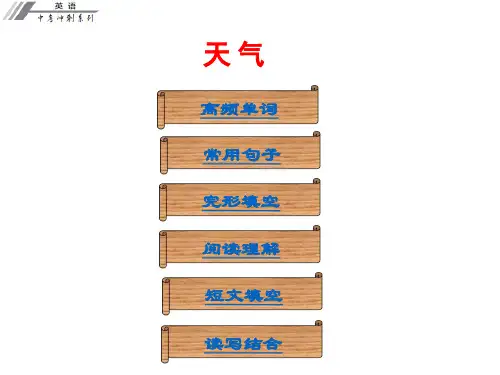

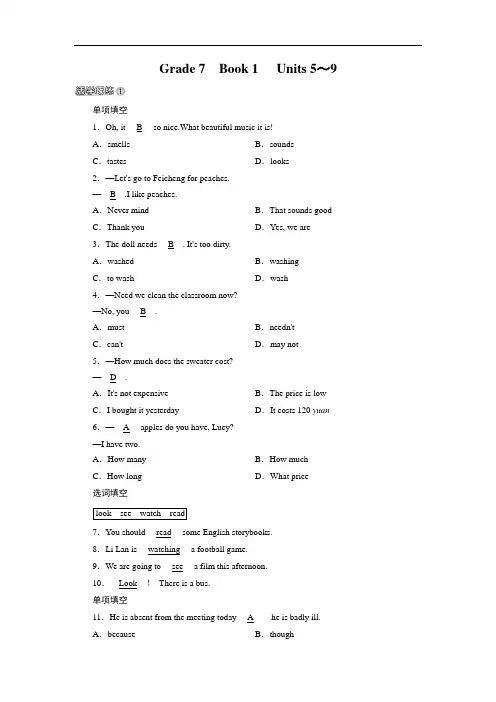
Grade 7Book 1Units 5~9单项填空1.Oh, it __B__ so nice.What beautiful music it is!A.smells B.soundsC.tastes D.looks2.—Let's go to Feicheng for peaches.—__B__.I like peaches.A.Never mind B.That sounds good C.Thank you D.Yes, we are 3.The doll needs __B__. It's too dirty.A.washed B.washingC.to wash D.wash 4.—Need we clean the classroom now?—No, you __B__.A.must B.needn'tC.can't D.may not 5.—How much does the sweater cost?—__D__.A.It's not expensive B.The price is low C.I bought it yesterday D.It costs 120 yuan 6.—__A__ apples do you have, Lucy?—I have two.A.How many B.How much C.How long D.What price选词填空look see watch read7.You should __read__ some English storybooks.8.Li Lan is __watching__ a football game.9.We are going to __see__ a film this afternoon.10.__Look__!There is a bus.单项填空11.He is absent from the meeting today __A__ he is badly ill. A.because B.thoughC.but D.as12.The little boy often makes a lot of mistakes __B__ his careless. A.because B.because ofC.as D.since13.—Sam, my iPhone 7 plus is in my bedroom.Could you __B__ it for me? —No problem.A.bring B.fetchC.take D.carry14.The No.27 bus will__D__ you there.A.fetch B.bringC.catch D.take15.What present did you __C__ for your birthday?A.carry B.takeC.get D.fetch。
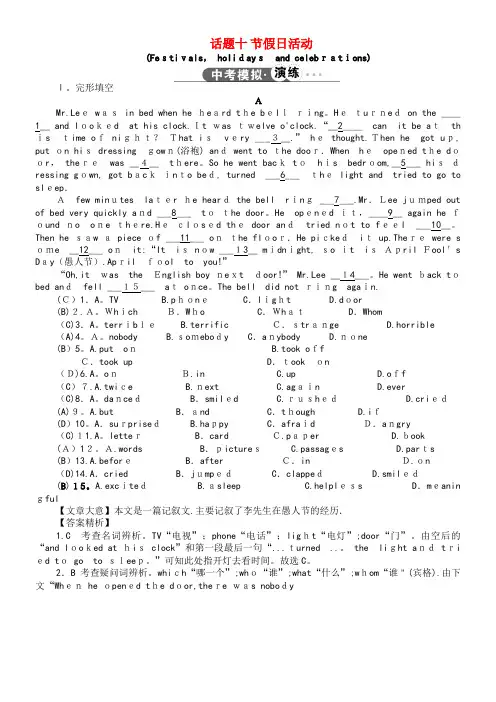
话题十节假日活动(Festivals, holidaysand celebrations)Ⅰ。
完形填空AMr.Lee was in bed when he heard the bellring。
Heturned on the __1__ and looked at his clock.It was twelve o'clock.“__2__can it be atth istime of night?That isvery __3__.” he thought.Then he got up, put on his dressinggown(浴袍) and went to the door.When heopened the door, therewas __4__there。
So he went back tohis bedroom,__5__ hisdressing gown, got backinto bed, turned__6__the light and tried to go to sleep.Afew minutes later he heard the bell ring __7__.Mr.Lee jumped out of bed very quickly and __8__tothe door。
He opened it,__9__ again he found no one there.Heclosed the door andtried not to feel__10__。
Then he saw a piece of __11__ onthe floor.He pickedit up.There were s ome__12__ onit:“It is now __13__ midnight, so it isApril Fool's Day(愚人节).Aprilfool to you!”“Oh,itwas theEnglish boy nextdoor!” Mr.Lee __14__。
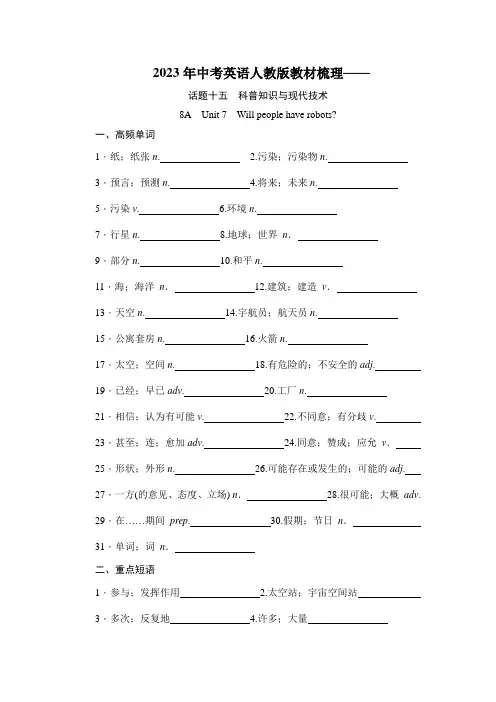
2023年中考英语人教版教材梳理——话题十五科普知识与现代技术8A Unit 7Will people have robots?一、高频单词1.纸;纸张n. 2.污染;污染物n.3.预言;预测n. 4.将来;未来n.5.污染v. 6.环境n.7.行星n. 8.地球;世界n.9.部分n. 10.和平n.11.海;海洋n.12.建筑;建造v.13.天空n. 14.宇航员;航天员n.15.公寓套房n. 16.火箭n.17.太空;空间n. 18.有危险的;不安全的adj.19.已经;早已adv. 20.工厂n.21.相信;认为有可能v. 22.不同意;有分歧v.23.甚至;连;愈加adv. 24.同意;赞成;应允v.25.形状;外形n. 26.可能存在或发生的;可能的adj. 27.一方(的意见、态度、立场) n.28.很可能;大概adv. 29.在……期间prep. 30.假期;节日n.31.单词;词n.二、重点短语1.参与;发挥作用 2.太空站;宇宙空间站3.多次;反复地 4.许多;大量5.突然倒下;跌倒;倒塌 6.寻找;寻求三、重点语法( )1.China red the soul (灵魂) of Chinese nation. It's Chinese people's favorite color.A.cares for B.looks for C.stands for D.hopes for( )2.Tigers will protect their families if there is .A.dangerous B.in danger C.danger D.in dangerous9Unit 5What are the shirts made of?一、高频单词1.老板;上司n. 2.硬币n.3.(尤指有帽舌的)帽子n. 4.餐叉;叉子n.5.气球n. 6.棉;棉花n.7.筷子n. 8.玻璃n.9.形式;类型n. 10.叶;叶子n.11.热;高温;加热;变热n.&v. 12.(分手指的)手套n.13.草;草地n. 14.小手提包n.15.材料;原料n. 16.钢;钢铁n.17.邮递员n. 18.交通;路上行驶的车辆n.19.表面;表层n. 20.(女式)短上衣;衬衫n.21.银;银器;银色的n.&adj. 22.避免;回避v.23.生产;制造;出产v. 24.完成v.25.国际的adj. 26.每天的;日常的adj.27.展览会;交易会n.28.生气勃勃的;(色彩)鲜艳的adj.29.它的adj.二、重点短语1.以……闻名;为人知晓 2.不论;无论三、重点语法( ) 1.—What language in Singapore?—Singapore is an English-speaking country, but you can speak Putonghua a lot of the time.A.speak B.spoken C.is speaking D.is spoken( )2.It's reported that a lot of trees in the area every year.A.plant B.planted C.are planted D.were planted9Unit 6When was it invented?一、高频单词1.篮;筐n. 2.饼干n.3.钟(声);铃(声)n. 4.英雄;男主角n.5.顾客;客户n. 6.先锋;先驱n.7.器械;仪器;工具n. 8.网站n.9.曲奇饼n. 10.某人;重要人物pron.&n.11.地震n. 12.名单;清单;列表;列清单n.&v.13.冰箱n. 14.疑惑;疑问;怀疑n.&v.15.交易;贸易;做买卖n.&v. 16.高兴;愉快n.17.项目;工程n. 18.锁上;锁住;锁v.&n.19.气味;发出……气味;闻到n.&v. 20.加拿大人;加拿大(人)的n.&adj.21.翻译v. 22.分开;分散v.23.提到;说到v. 24.保持不变;剩余v.25.低的;矮的adj. 26.突然(的) adj.27.酸的;有酸味的adj. 28.国家的;民族的adj.29.每日的;日常的adj. 30.几乎;差不多adv.二、重点短语1.把……分开 2.不但……而且……3.发生;出现 4.偶然;意外地5.毫无疑问;的确 6.错误地;无意中7.奥林匹克运动会三、重点语法( )1.—Who's the little boy in the photo?—It's me.The photo when I was six years old.A.takes B.took C.was taken D.were taken( )2.—When was the telephone invented?—I think it in 1875, but I am not sure.A.invented B.was invented C.are inventing D.were invented备考演练一、语法选择WENCHANG, Hainan, Nov. 24 (Xinhua)—China Tuesday launched a spacecraft(宇宙飞船) to collect and return samples 1. the moon, the country's first 2. to retrieve samples(采集样本) from an extraterrestrial body(外星体).A Long March-5 rocket, carrying the Chang e-5 spacecraft, blasted off(发射) from the Wenchang Spacecraft Launch Site(飞船发射场) on the coast of southern island province of Hainan 3. 4:30 a.m.Chang e-5 is one of the most complicated(复杂的) and challenging missions inChina's aerospace history(航天史),as 4. as the world's first moon -sample mission for more than 40 years.“The mission will help 5. China's science and technology development, and lay an important foundation(基础) for China's future manned lunar landing and deep space exploration,” 6. Pei Zhaoyu, deputy director of the Lunar Exploration and Space Program Center of the China National Space Administration.Pei said 7. the Chang e-5 mission succeeds, China's current lunar exploration project would come to a successful conclusion.8.after Chinese legendary moon goddess Chang-e, China's current three-step lunar exploration program, which 9. in 2004, includes orbiting and landing on the moon, and bringing back samples.“10. the program, China has acquired(取得) the basic technologies of unmanned lunar exploration,” said Pei.( )1.A.about B.with C.from( )2.A.flight B.try C.plan( )3.A.in B.on C.at( )4.A.long B.soon C.well( )5.A.promote B.spread C.translate( )6.A.says B.saying C.said( )7.A.if B.whether C.since( )8.A.Looked B.Named C.Run( )9.A.began B.ended C.paused( )10.A.Through B.Across C.Although二、短文填空Now, it seems that artificial intelligence (人工智能) is becoming more and more popular in our life, and 1. has greatly influenced the ways we live, work and play.Recently, a scientist has invented a special robot 2. can be atable tennis coach.That means people can practise table tennis not only with humans but also with a 3. .Named Forpheus, the smart table tennis robot is quite special.It can study the movements of human players and the speeds of the ball. 4. this way, it can exactly judge (判断) the players' skill levels.Then it uses the information to change its ways of 5. table tennis.If the players are just beginners, Forpheus will play in 6. slow and easy way, but if the players are better ones, the robot will play in a 7. and more difficult way.What's more, while playing, it encourages players to 8. their best with words like “Good job!” “Come on!” and so on.At the same 9. it gives them some good advice to improve their skills. 10. it is both a good partner and a clever coach.“In the next 20 years, it will be possible that one robot teaches another to play table tennis or even invents another one!” Takuoyo, the inventor of the robot, said.三、话题写作中国科技的发展与进步,让中国越来越强大,也给人们的生活带来了越来越多的变化,请结合上文的内容,以“My View on Chinese Science and Technology”为题,用英语写一篇短文。
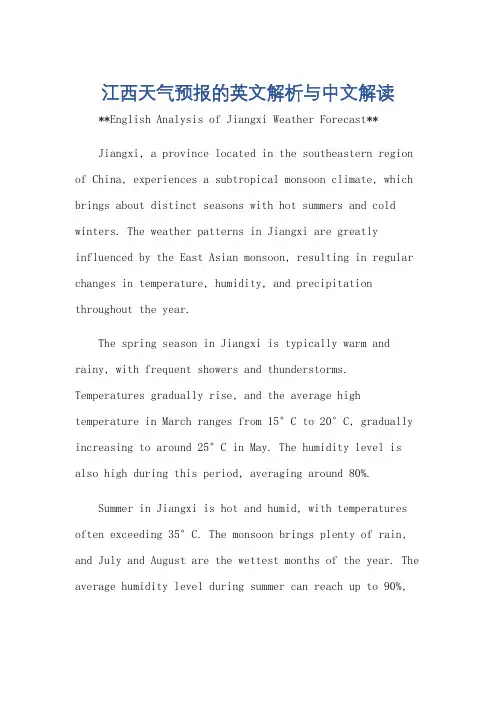
江西天气预报的英文解析与中文解读**English Analysis of Jiangxi Weather Forecast**Jiangxi, a province located in the southeastern region of China, experiences a subtropical monsoon climate, which brings about distinct seasons with hot summers and cold winters. The weather patterns in Jiangxi are greatly influenced by the East Asian monsoon, resulting in regular changes in temperature, humidity, and precipitation throughout the year.The spring season in Jiangxi is typically warm and rainy, with frequent showers and thunderstorms. Temperatures gradually rise, and the average high temperature in March ranges from 15°C to 20°C, gradually increasing to around 25°C in May. The humidity level is also high during this period, averaging around 80%.Summer in Jiangxi is hot and humid, with temperatures often exceeding 35°C. The monsoon brings plenty of rain, and July and August are the wettest months of the year. The average humidity level during summer can reach up to 90%,making it feel even hotter. Thunderstorms and typhoons are also common during this season.Autumn in Jiangxi is generally cool and dry, with temperatures gradually decreasing. The average high temperature in September is around 28°C, dropping toaround 15°C by November. The humidity level also decreases, averaging around 70%. Autumn is often considered the most comfortable season in Jiangxi, with clear skies andpleasant temperatures.Winter in Jiangxi is cold and dry, with temperatures often below freezing. Snowfall is rare, but frost and ice are common. The average low temperature in January isaround 0°C, an d the humidity level averages around 60%.Overall, the weather in Jiangxi varies significantly throughout the year, with each season bringing its own unique challenges and beauty. It is essential to keep upwith the latest weather forecasts to plan accordingly and prepare for the changing conditions.**中文解读**江西位于中国东南部,拥有亚热带季风气候,四季分明,夏季炎热,冬季寒冷。
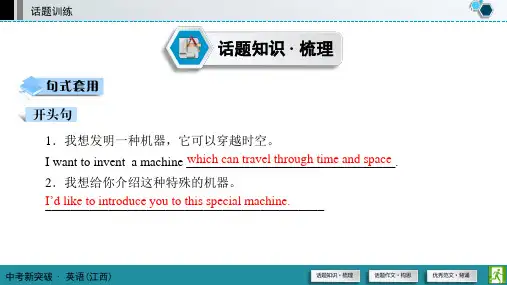
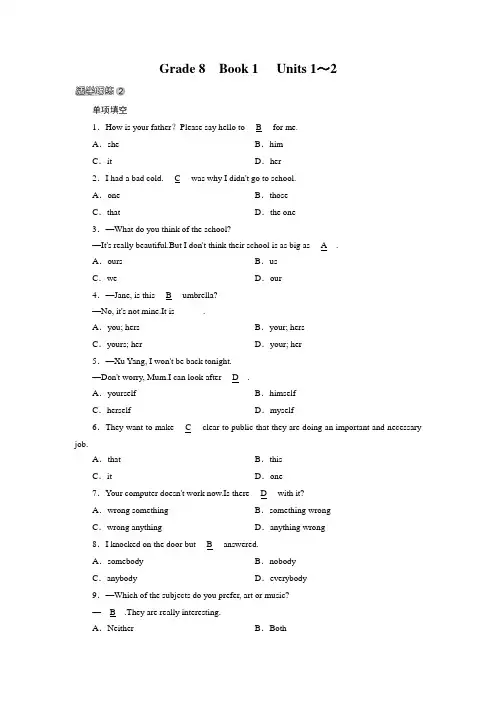
Grade 8Book 1Units 1~2单项填空1.How is your father?Please say hello to __B__ for me.A.she B.himC.it D.her2.I had a bad cold. __C__ was why I didn't go to school.A.one B.thoseC.that D.the one3.—What do you think of the school?—It's really beautiful.But I don't think their school is as big as __A__.A.ours B.usC.we D.our4.—Jane, is this __B__ umbrella?—No, it's not mine.It is ______.A.you; hers B.your; hersC.yours; her D.your; her5.—Xu Yang, I won't be back tonight.—Don't worry, Mum.I can look after __D__.A.yourself B.himselfC.herself D.myself6.They want to make __C__ clear to public that they are doing an important and necessary job.A.that B.thisC.it D.one7.Your computer doesn't work now.Is there __D__ with it?A.wrong something B.something wrongC.wrong anything D.anything wrong8.I knocked on the door but __B__ answered.A.somebody B.nobodyC.anybody D.everybody9.—Which of the subjects do you prefer, art or music?—__B__.They are really interesting.A.Neither B.BothC.None D.All10.—Everyone knows Canada is the second largest country in the world.—That is, it is larger than __B__ country in Asia.A.any B.any otherC.other D.another11.Hello, __B__ is Jim speaking.The weather in Wuhan is hotter than ______ in Beijing. A.that; that B.this; thatC.that; those D.this; those12.—How much lemon juice do we left, Grace?—There's __A__ left.So let's go to the supermarket to buy it.A.none B.noC.some D.any13.My sister isn't able to ride the bike, so I'm going to help __B__ with it.A.me B.herC.myself D.herself14.—__B__ one do you like, the blue one or the red one?—The red one.A.What B.WhichC.That D.This15.—__B__ iPhone 7 is this?—It's his.A.Which B.WhoseC.What D.These。
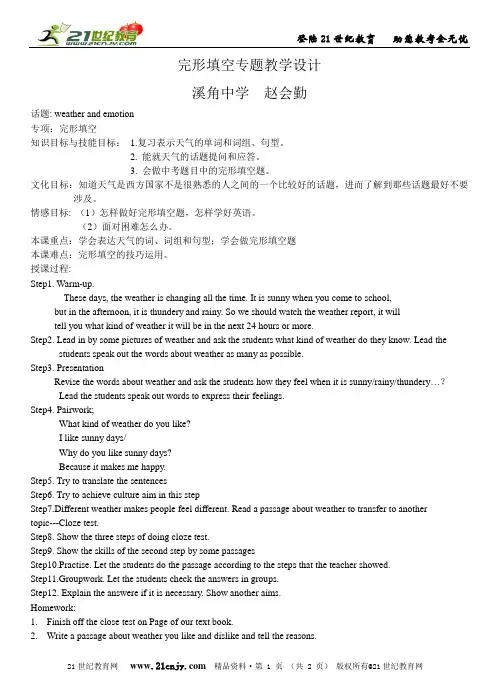
完形填空专题教学设计溪角中学赵会勤话题: weather and emotion专项:完形填空知识目标与技能目标: 1.复习表示天气的单词和词组、句型。
2. 能就天气的话题提问和应答。
3. 会做中考题目中的完形填空题。
文化目标:知道天气是西方国家不是很熟悉的人之间的一个比较好的话题,进而了解到那些话题最好不要涉及。
情感目标: (1)怎样做好完形填空题,怎样学好英语。
(2)面对困难怎么办。
本课重点:学会表达天气的词、词组和句型;学会做完形填空题本课难点:完形填空的技巧运用。
授课过程:Step1. Warm-up.These days, the weather is changing all the time. It is sunny when you come to school,but in the afternoon, it is thundery and rainy. So we should watch the weather report, it willtell you what kind of weather it will be in the next 24 hours or more.Step2. Lead in by some pictures of weather and ask the students what kind of weather do they know. Lead the students speak out the words about weather as many as possible.Step3. PresentationRevise the words about weather and ask the students how they feel when it is sunny/rainy/thundery…?Lead the students speak out words to express their feelings.Step4. Pairwork;What kind of weather do you like?I like sunny days/Why do you like sunny days?Because it makes me happy.Step5. Try to translate the sentencesStep6. Try to achieve culture aim in this stepStep7.Different weather makes people feel different. Read a passage about weather to transfer to anothertopic---Cloze test.Step8. Show the three steps of doing cloze test.Step9. Show the skills of the second step by some passagesStep10.Practise. Let the students do the passage according to the steps that the teacher showed.Step11.Groupwork. Let the students check the answers in groups.Step12. Explain the answere if it is necessary. Show another aims.Homework:1.Finish off the close test on Page of our text book.2.Write a passage about weather you like and dislike and tell the reasons.。

江西天气预报的英语作文**Title: Weather Forecast for Jiangxi Province**As the sun rises in the east, casting its golden rays over Jiangxi, the province wakes up to a new day, filled with promise and potential. The weather, always a crucial aspect of daily life, plays a pivotal role in shaping the activities and plans of the inhabitants of this lush and vibrant land.The province, known for its diverse geography and rich cultural heritage, experiences a unique blend of weather patterns that range from温和的 spring breezes to the scorching summer heat, from the refreshing autumn coolness to the chilly winter winds.**Spring**As spring ushers in a new season of growth and renewal, Jiangxi experiences a gentle transition from the cold winter to the warmth of the summer. The temperatures hover around the comfortable range of 15-25°C, making it anideal time for outdoor activities and nature exploration.The rains are moderate, ensuring ample moisture for the crops and plants to thrive.**Summer**The summer season brings about a surge in temperatures, with the m ercury often crossing the 35°C mark. The hot and humid weather is perfect for water sports and beach activities, but it's also important to stay hydrated and protected from the harsh sun. Occasional thunderstorms and heavy showers provide a brief respite from the heat.**Autumn**Autumn brings about a cooling breeze and a change in the color palette of the province. The temperatures drop gradually, making it a comfortable time for outdoor activities. The skies are clearer, and the air is filled with the scent of ripening crops and falling leaves. Thisis also a great time for hiking and nature photography.**Winter**Winter, although relatively mild in Jiangxi, can still bring about a chill in the air. Temperatures hover around the 10°C mark, with occasional frosts and light snowfall.The province experiences less rainfall during this time, making it a good season for indoor activities like reading, cooking, or simply enjoying a cup of hot tea by the fireplace.In conclusion, Jiangxi's weather provides a diverse range of experiences for its residents and visitors. Whether it's the blooming flowers of spring, the sunny beaches of summer, the falling leaves of autumn, or thecozy winters, each season has its own charm and beauty.It's this unique blend of weather patterns that makesJiangxi a captivating destination, worth exploring and experiencing.**江西天气预报英语作文解析**江西,这片位于中国东南部的土地,因其丰富的自然资源和深厚的文化底蕴而备受瞩目。
Grade 9Units 3~4单项填空1.—Do you know__C__ have our summer holiday?—Next week.A.when will we B.when are weC.when we will D.when we are2.—Excuse me.Could you tell me__B__?—Yes, there is a video shop next to the tall building.A.where can I buy some CDs B.where I can buy some CDs C.when can I buy some CDs D.when I can buy some CDs 3.He asked me __B__ we could go to Beijing to watch the game by plane. A.that B.ifC.how D.what4.—What did you say to your mother just now?—I asked her __D__ she cooked for dinner.A.that B.ifC.how D.what5.—Did you know __C__ at the bus stop?—Maybe their teacher.A.who are they waiting for B.whom they are waiting for C.whom they were waiting for D.who they are waiting for6.—I wonder __B__.—Once a year.A.how long you have studied EnglishB.how often your school sports meeting is heldC.how many times your school has held Art FestivalD.how soon you went to school7.—Did the radio say __B__?—Yes, from Hunan.A.when the bad rice came B.where the bad rice came from C.when did the bad rice come D.where did the bad rice come from 8.I don't understand __D__ that everything's fine when he suffered such a lot. A.what can he say B.how can he sayC.where he can say D.how he can say9.—We will have a new biology teacher this term.Do you know __A__?—I heard that he was a doctor in his hometown.A.what he did B.what was heC.what his job is D.what is his job10.—Miss Lee, I didn't catch what you said.Could you tell me __D__ again? —OK.A.what should we take B.where shall we meet C.when we would start D.how we will get there 11.Until now they haven't decided __A__ to build the railway.A.when B.whatC.if D.that12.—Do you know __C__ in their family?—Yes.But I hope they can solve problems peacefully.A.how was happened B.how has happenedC.what has happened D.what was happening 13.Rock forgets __C__ that morning.A.if he had seen the sunrise B.whether he had seen the sunrise C.whether he saw the sunrise D.that he saw the sunrise句型转换14.Jack's grandfather doesn't know how he should use a computer.(改为简单句) Jack's grandfather doesn't know how __to__ __use__ a computer.15.Does the earth go round the sun?My son asked the teacher.(合并为宾语从句)My son asked the teacher __if/whether__ the earth __goes__ round the sun.。
Grade 9Units 13~14单项填空1.Mr. Smith __C__ short stories, but he ______ a TV play these days.A.is writing; is writing B.is writing; writesC.writes; is writing D.writes; writes2.Look! The boy students are __B__ football while the girls are ______.A.playing; dance B.playing; dancingC.play; dancing D.play; dance3.There __D__ a lot of red-crowned cranes(丹顶鹤) in this area.A.was used to B.was used to beC.used to D.used to be4.He used to __A__ in a small village, but now he has been used to ______ in the big city. A.live; living B.live; liveC.living; living D.living; live5.When I got to his office, I __B__ that he ______ out.A.told; had been B.was told; wasC.had told; was D.was told; had been6.The problem __A__ last week is very important.A.was discussed B.discussedC.being discussed D.be discussed7.—Who will go to the station to meet Lorry?—I will. I __B__ her several times.A.met B.have metC.had met D.will meet8.The Smiths __C__ in China for eight years.A.has lived B.livedC.have been D.have lived9.You __C__ have the soup if you don't like it.A.shouldn't B.mustn'tC.needn't D.can't10.I can't go to the cinema with you because I __D__ stay here until my mother comes back. A.can B.couldC.may D.must11.He told me __D__ he would catch the early bus.A.which B.whetherC.why D.that12.Can you tell me why __A__ yesterday?A.you didn't come B.did you not comeC.didn't you come D.you don't come13.There __C__ a meeting tomorrow afternoon.A.will be going to B.will going to beC.is going to be D.will go to be14.—Where is the morning paper?—I __D__ it for you at once.A.get B.am gettingC.to get D.will get15.—Would you mind __B__ your voice down? We are doing our homework. —Sorry for that.A.keep B.keepingC.to keep D.kept16.We went to the beach last Sunday and we had great fun __B__ volleyball. A.play B.playingC.played D.to play。
话题十一:天气、旅游与交通(124个)(一)天气与温度(25个) 1.weather n.天气2.sunny adj.晴朗的3.cloudy adj.多云的4.wind n.风5.windy adj.有风的;多风的6.snow v.下雪n.雪7.snowy adj.下雪的;多雪的8.rain v.下雨n.雨水9.rainy adj.下雨的;多雨的10.dry adj.干的;干燥的11.wet adj.湿的;潮湿的12.cold adj.冷的;寒冷的13.hot adj.热的14.warm adj.暖和的;温暖的15.cool adj.凉的;凉爽的16.lift v.(云、烟等)消散17.shine n.阳光;晴天v.发光;照耀18.shower n.阵雨19.storm n.风暴;暴风雨20.zero n.零度21.temperature n.温度22.degree n.度;度数(温度单位)23.heat n.热度24.air n.空气25.cloud n.云(二)城市设施与交通旅游(99个)城市设施1.★bank n.银行2.★capital n.省会;首都3.church n.教堂4.city n.城市;都市;市5.cinema n.电影院6.college n.专科学校;学院7.company n.公司8.factory n.工厂9.fair n.集市;庙会;展览会11.flat n.楼中一套房间;公寓(常用复数)12.garden n.花园;果园;菜园13.government n.政府14.grass n.草;草地;草坪15.gym(=gymnasium) n.体育馆16.hometown n.家乡;故乡17.★hospital n.医院18.hotel n.旅馆19.★library n.图书馆20.market n.市场;集市21.★museum n.博物馆22.palace n.皇宫;宫殿23.park n.公园;停车24.place n.地方;处所25.pond n.池塘26.pool n.水池27.prison n.监狱28.province n.省份29.★restaurant n.餐馆;饭店30.set n.设备;设置31.shop n.商店32.store n.商店33.square n.广场34.stand n.立场;观点;看台;货;摊35.state n.(构成联邦共和国的)州;邦36.supermarket n.超市37.theater(英theatre) n.戏院;剧院;电影院38.toilet n.厕所39.tower n.塔;高楼40.★university n.大学41.town n.镇;城镇;市镇42.zoo n.动物园43.building n.建筑物;大楼44.community n.社区45.block n.街区46.club n.俱乐部47.row n.(剧院、电影院的)一排座位49.court n.法庭;球场交通设施1.★airport n.飞机场2.★bridge n.桥3.crossing n.十字路口4.direction n.方向5.flag n.旗;旗帜6.mark n.记号;痕迹7.path n.小路;小径8.★railway n.铁路;铁轨9.road n.路;道路10.station n.站;所;台11.stop n.车站12.street n.街;街道13.★traffic n.交通;交通量14.way n.道路交通工具1.airplane n.飞机2.★bicycle(=bike) n.自行车;两轮脚踏车3.board n.甲板4.boat n.小船5.bus n.公共汽车6.car n.小汽车7.express n.快车;特快专递8.★license n.执照;许可证9.motorcycle n.摩托车10.★plane n.飞机11.ship n.船;轮船12.subway n.地铁13.taxi n.出租车14.train n.火车15.truck n.卡车16.underground n.地铁17.wheel n.车轮18.onfoot(=walk) 步行旅游1.airline n.航空公司2.beach n.海滩;沙滩3.camp n.&v.露营;营地4.★country n.国家5.journey n.旅行7.★package n.包裹8.★picnic n.(自带食物的)郊游;野餐9.sail n.&v.帆;航行10.★passport n.护照11.sight n.视力;景物12.sightseeing n.观光13.tent n.帐篷14.tour n.参观;观光;游览15.★travel n.&v.旅行;游历16.trip n.旅行17.visit n.&v.参观;游览;拜访;访问18.visitor n.参观者;访问者。
天气英语阅读题初中Title:天气英语阅读题初中正文:天气是我们生活中一个非常重要的话题。
在英语阅读题中,天气也是一个重要的主题。
下面我们来介绍一下天气英语阅读题初中的一些常见题型。
1. 描述天气题目这种题目通常要求阅读一篇描述天气的文章,然后回答问题。
例如,如果阅读的文章是“今天天气很好,阳光明媚,温度适宜”,那么问题可能是“今天天气如何?”或者“这篇文章描述了什么样的天气?”。
2. 判断天气题目这种题目要求阅读一篇短文,然后根据短文的内容来判断天气。
例如,如果阅读的文章是“今天天气很好,阳光明媚,温度适宜”,那么问题可能是“今天是否是晴天?”。
3. 解释天气题目这种题目要求阅读一篇短文,然后回答问题,以解释短文中描述的天气现象。
例如,如果阅读的文章是“今天天气很好,阳光明媚,温度适宜”,那么问题可能是“为什么今天天气很好?”。
除了以上三种常见的题型之外,还有一些特殊的天气题型,例如“描述天气的问答”、“解释天气的推断题”等。
这些题型都需要同学们在阅读文章之后,仔细理解文章的内容,进行思考和推理。
除了阅读天气文章之外,同学们还可以学习一些有关天气的谚语和常识,例如如何预测天气、如何防范天气等。
这些知识和技能对于同学们的日常生活和健康成长都非常重要。
拓展:除了英语阅读题之外,天气也是中考高考等考试中常见的主题之一。
同学们可以在日常生活中注意观察天气预报,了解不同天气条件下的应对措施,从而提高自己的天气预报能力和应对天气的能力。
此外,同学们还可以关注一些天气预报相关的网站和应用程序,例如NASA、天气预报网站等,以便及时了解天气信息和变化。
天气是我们生活中一个非常重要的话题。
在英语阅读题中,天气也是一个重要的主题。
同学们可以通过阅读天气相关的文章和了解天气相关的知识和技能,提高自己的阅读理解和应对天气的能力。
话题十五天气(Weather)Ⅰ.完形填空AIt was a very foggy day in London. The fog was so thick that it was __1__ to see more than a foot or so. __2__,cars and taxis were not able to run and were standing by the side of the road. People were trying to __3__ their way about on foot but were losing their way in the fog.Mr. Smith had a very important __4__ at the Houses of Parliament and had to get there but no one could take him. He tried to walk there __5__ found he was quite lost. Suddenly he bumped into a stranger. The stranger said, “Sir, if you want to go somewhere, I can__6__ you.”Mr. Smith was very __7__ and asked,“How can you find the way when there is thick fog __8__?”“Don't worry, sir,”answered the stranger. “__9__ me.”So Mr.Smith told the stranger __10__ he wanted to go, and they started. The fog was getting thicker every minute but the stranger had no __11__ in finding the way. They went along one street, turned down __12__,crossed a square and at last after about half an hour's __13__ they arrived at the Houses of Parliament. Mr. Smith __14__ the stranger a pound. “It is wonderful. I'm not late for meeting on time.” he said. “But how do you find the way in this fog?”“It is no trouble at all to me,”said the stranger, “I am __15__. It's exactly the same for me in the fog.”(C)1.A.able B.probable C.impossible D.enjoyable(B)2.A.Planes B.Buses C.Ships D.Trains(A)3.A.find B.push C.lose D.force(D)4.A.lecture B.concert C.speech D.meeting(B)5.A.so B.but C.therefore D.and(A)6.A.guide B.teach C.remind D.choose(D)7.A.disappointed B.afraid C.tired D.surprised(D)8.A.nowhere B.somewhere C.anywhere D.everywhere(B)9.A.Leave B.Believe C.Forgive D.Remember(A)10.A.where B.what C.how D.which(B)11.A.interest B.difficulty C.time D.need(A)12.A.another B.other C.one D.the other(D)13.A.ride B.work C.drive D.walk(D)14.A.lent B.borrowed C.returned D.gave(B)15.A.deaf B.blind C.clever D.lucky【文章大意】本文是一篇记叙文。
主要讲述了史密斯先生要去国会开会但是在大雾的天气里迷了路,一位陌生人带他到了开会的地点,史密斯先生很好奇他是如何在大雾天找到方向的,陌生人告诉他说自己是一名盲人。
【答案精析】1.C考查形容词辨析。
able“有能力的”;probable“可能的”;impossible“不可能的”;enjoyable“享受的”。
由上文大雾如此厚可知此处表示,人们不能看清楚。
故选C。
2.B考查名词辨析。
planes“飞机”;buses“公交车”;ships“轮船”;trains“火车”。
由后文“and were standing by the side of the road”可知是一种停靠在路边的交通工具,故选B。
3.A考查动词辨析。
find“找到”;push“推”;lose“失去”;force“迫使”。
结合上下文内容可知此处表示,人们努力找寻路的方向,但是都迷路了。
4.D考查名词辨析。
lecture“讲座”;concert“音乐会”;speech“演讲”;meeting“会议”。
由后文“It is wonderful. I'm not late for meeting on time.”可知史密斯先生有一个重要的会议。
5.B考查连词辨析。
so“所以”;but“但是”;therefore“因此”;and“和;并且”。
由空格前后的内容可知此处表示,他努力走去那儿,但是发现自己迷路了。
6.A考查动词辨析。
guide“带领,引导”;teach“教”;remind“提醒”;choose“选择”。
由后文内容可知,陌生男子带领史密斯先生去了国会。
故选A。
7.D考查形容词辨析。
disappointed“失望的”;afraid“害怕的”;tired“疲惫的”;surprised“惊讶的”。
因为雾很浓大家都看不清楚路,史密斯先生对于陌生人能帮他带路感到惊讶,通过后文他问的话可以看出。
故选D。
8.D考查不定代词辨析。
nowhere“没有地方”;somewhere“某个地方”;anywhere“任何地方”;everywhere“到处”。
由上下文语境可知此处表示,到处都是浓雾,故选D。
9.B考查动词辨析。
leave“离开”;believe“相信”;forgive “原谅”;remember“记得”。
由上文内容陌生男子叫史密斯先生别担心,说明他很自信,因此他说“请相信我”。
10.A考查疑问代词辨析。
where“哪里”;what“什么”;how“怎样”;which“哪一个”。
由空格后的want to go可知此处表示史密斯先生告诉他要去哪里。
11.B考查名词辨析。
interest“兴趣”;difficulty“困难”;time“时间”;need“必要”。
由上下文语境可知此处表示,陌生男子在浓雾下找路没有任何困难,have no difficulty in doing sth. 表示“做某事没有困难”,故选B。
12.A考查代词辨析。
another“另一个”;other“其他的”; one“一个”;the other“两者中的另一个”。
由上下文语境可知此处表示,他们走过一条街转向另一条街。
one...another...“一个……,另一个……”,故选A。
13.D考查名词辨析。
ride“乘;骑”;work“工作”;drive“驾驶”;walk“步行”。
由上文可知,他们是步路去的,故选D。
14.D考查动词辨析。
lent“借(出)”;borrowed“借(进)”;returned“返回”;gave“给”。
由空格后的a pound及上下文语境可知此处表示,史密斯先生给了带路的陌生人一英镑。
give ab. sth.“给某人某物”,为固定搭配,故选D。
15.B考查形容词辨析。
deaf “聋的”;blind“盲的”;clever“聪明的”;lucky“幸运的”。
由下“句对他来说有没有雾都一样”,可知他是盲人。
B请先阅读下面短文,掌握其大意,然后用方框中所给的词的适当形式填空。
每个词限用一次。
happen weather terrible go but die show home clear endangeredThere have been thousands of studies on climate change. The main message of all those studies is: climate change is real, and it is 1 happening here and there in our world.Scientists recently showed a study on climate change, from the effects on 2 endangered animals to changes in agriculture(农业). The new report tells us just how 3 terrible the effects of a warming world will be.According to the study, rivers of ice will continue to 4 go away as the climate warms. Living things on land and in the sea are changing their range in answering the warmer 5 weather,__andsome will face an increased risk of 6 death. The seas will continue to become more acidic(酸的), killing many living things in the sea.7 But the report does not try to show us the extent of the effects. It just wants 8 to__show how difficult it is to find out how the planet will deal with rising temperatures. The report makes us9 clearly know about a changing climate. And it puts climate change in the situation of the too many other risks that humans face.The planet that is 10 home to some 7 billion people is already a place that's kind of small—and uncontrolled warming could get us into trouble.【文章大意】本文是一篇说明文。